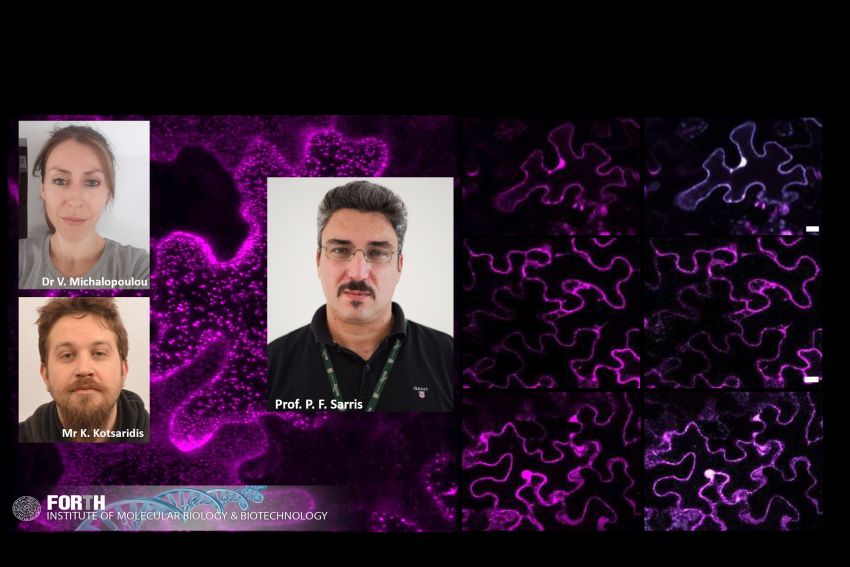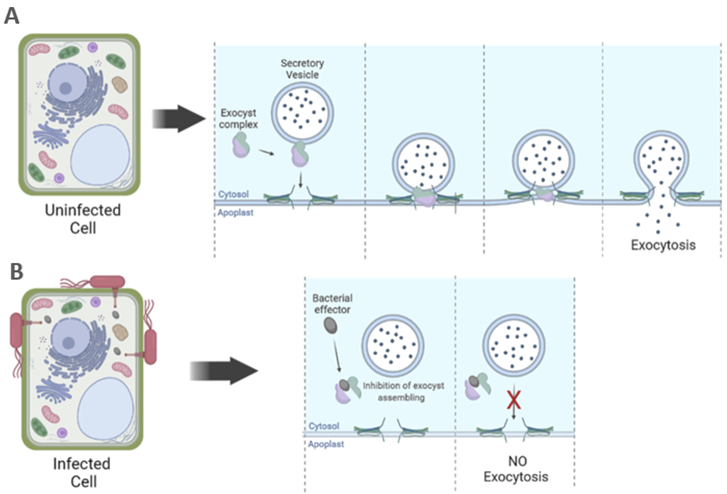Biosciences, Biotechnology

Pathogenic bacteria inhibit host cell secretion to manipulate host immunity
In nature, there is a constant evolutionary battle between microbes and their hosts, during which, many bacteria secrete specific proteins into the host’s cells, aiming to alter its physiology, while increasing pestiferous activity.
A recent research article, published in the prestigious scientific journal The Plant Cell and distinguished as one of the most interesting of the current issue, reveal that some phytopathogenic bacteria use specific virulence proteins to inhibit the exocyst-dependent secretion machinery of the host cells. The research was conducted by the "Microbiology and Molecular Host-Microbe Interactions" group of Professor Panagiotis F. Sarris, (Institute of Molecular Biology and Biotechnology – IMBB, FORTH and Department of Biology of the University of Crete - UoC).
Pathogenic bacteria, of both plants and animals, use common strategies to infect their hosts. During infection, the exocyst-dependent secretion machinery plays a crucial role in the host cells’ defence, by secreting specific antimicrobials into the extracellular space and translocating immune receptors at the plasma membrane, in order to inhibit the growth of pathogens.
This study revealed a hitherto unknown strategy of economically important pathogenic bacteria of Xanthomonas genus, which use a specific virulence protein (effector) that interferes with the assembly of the exocyst protein complex, in order to inhibit the exocyst-dependent secretion mechanism of the host cells.
“Our study was carried out in the Arabidopsis thaliana model-plant, which appears to be an excellent model for the study of bacterial pathogenesis, and revealed that some microbes manages to inhibit exocyst complex by tricking the host's immune system. It is noteworthy that exocyst inhibition by the bacterium Xanthomonas occurs without activating the mechanisms of the host's defence", said Professor Panagiotis Sarris and Dr. Vassiliki Michalopoulou, postdoctoral collaborator of the team of Prof. Sarris and first author of this publication.
The research team continues to study the mechanism of microbial interference to the exocyst-dependent secretion machinery. Scientists point out that, due to the maintenance of the exocyst complex in higher eukaryotic organisms, there is evidence that this newly discovered inhibition mechanism is a strategy of many other pathogens of both plants and animals.
The research study was carried out in collaboration with the group of Professor Panagiotis N. Moschou (IMBB - FORTH and UoC), Professor Jonathan DG Jones (The Sainsbury Laboratory, John Innes Centre, UK) and Dr. Patrick Celie (Department of Biochemistry, Dutch Cancer Institute, Amsterdam, Netherlands).
The researchers of IMBB-FORTH & UoC which also participated in this research: Dr. Glykeria Mermigka (postdoctoral fellow), Mr. Konstantinos Kotsaridis (PhD candidate), Mrs. Andriani Mentzelopoulou (PhD candidate).
Source: The Plant Cell, doi:10.1093/plcell/koac162.
Link to the article: https://academic.oup.com/plcell/advance-article-abstract/doi/10.1093/plcell/koac162/6594126

Figure 1. Some phytopathogenic bacteria produce an effector protein that inhibits exocytosis by affecting the proper assembly of the exocyst complex.
Under normal conditions (A), the exocyst complex is properly assembled to translocate the secretory vesicles to the cell membrane for the secretion of their content into the apoplast.
When the cell is infected by the bacterium Xanthomonas (B), an effector protein blocks the proper assembly of the exocyst complex, thereby inhibiting the process of extracellular secretion.








